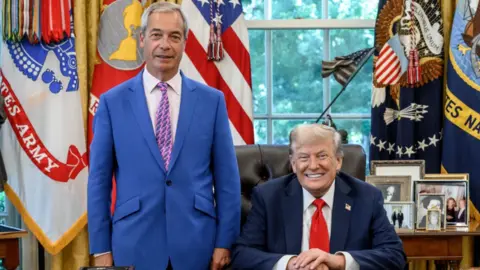Nigel Farage Tells Congress U.K. Speech Rules Threaten Americans’ Rights, Draws Sharp Democratic Criticism
Reform UK leader urged U.S. lawmakers and businesses to oppose British and EU online rules at a House Judiciary Committee hearing, prompting pointed rebukes from Democrats and protests from U.K. officials.
Nigel Farage told a U.S. congressional committee on Wednesday that online content rules adopted in the United Kingdom and the European Union threaten Americans’ free speech and innovation, urging U.S. lawmakers and businesses to push back. His testimony before the House Judiciary Committee drew sharp criticism from Democratic members, who accused the British politician of exporting partisan rhetoric to Washington.
Farage, leader of the Reform UK party, described what he called “the really awful authoritarian situation that the UK has sunk into” and said Britain had “kind of forgotten the Voltairean principles” that protect speech. He cited several high-profile British cases, including the treatment of writer Graham Linehan and a woman imprisoned over a racist tweet, as cautionary examples of government overreach.

The hearing was convened to examine whether digital regulations in the U.K. and EU could affect Americans’ ability to speak freely online and to assess their potential impact on U.S. technological innovation. Farage urged U.S. politicians and private companies to tell British officials, “you've simply got this wrong,” and at points compared conditions in Britain to those in North Korea.
Democratic Rep. Jamie Raskin of Maryland took aim at Farage in his opening remarks, saying, "To the people of the U.K. who think this Putin-loving, free speech impostor and Trump sycophant will protect freedom in your country, come on over to America and see what Trump and MAGA are doing to destroy our freedom… you might think twice before you let Mr. Farage ‘Make" — a remark that drew audible responses from members on both sides of the aisle. Other Democrats criticized Farage for using the U.S. forum to press political positions they argued he should pursue at home in Britain.
Farage’s visit also prompted rebukes from British government officials. Prime Minister Sir Keir Starmer said Farage had "flown to America to badmouth and talk down our country," and Labour’s Business Secretary Jonathan Reynolds said jetting to another country while hyping the prospect of damage to trade with close allies ‘‘is about as anti-British as you can get.’’

Farage has long been a polarizing figure in both British and international politics. He led the Brexit movement in the U.K. and has aligned with conservative and populist politicians abroad. In Washington, he has been a frequent commentator on free speech and media regulation and has cultivated relationships with some U.S. conservative figures. Democrats at the hearing framed his appearance as part of a broader effort by foreign political actors to influence U.S. discourse on regulation and public policy.
The hearing took place amid growing international debate over how to regulate online speech, content moderation and the responsibilities of technology platforms. European regulations aiming to curb harmful content and misinformation have been defended by their proponents as necessary to protect citizens and public safety, while critics contend such rules risk silencing lawful expression and stifling innovation.
Committee members questioned witnesses about the extraterritorial effects of foreign laws, the ability of U.S. companies to comply with differing national rules, and potential policy responses in Washington. Lawmakers from both parties reiterated their interest in balancing free expression with efforts to combat online harms, though they split on how to define the proper role for government in overseeing platform content.
Farage’s testimony is likely to add momentum to partisan debates in the United States over platform regulation, transatlantic trade implications and the broader struggle to set global norms for digital speech. Lawmakers on the House Judiciary Committee did not announce immediate legislative action stemming from the hearing, and committee leaders indicated further briefings and testimony could follow as members seek more technical analysis of the potential cross-border effects of European and U.K. regulatory frameworks.
The session underscored the transnational nature of online policy disputes and the extent to which foreign political figures can influence, and be drawn into, U.S. political arguments. Both supporters and critics of Farage said the hearing highlighted stark differences in how democracies approach the competing goals of protecting speech and addressing online harms.
Representatives for Farage and for the House Judiciary Committee did not immediately respond to requests for comment beyond statements made during the hearing. British government spokespeople reiterated their earlier criticisms of Farage’s decision to testify in Washington and said domestic policy debates should primarily be settled through U.K. institutions.